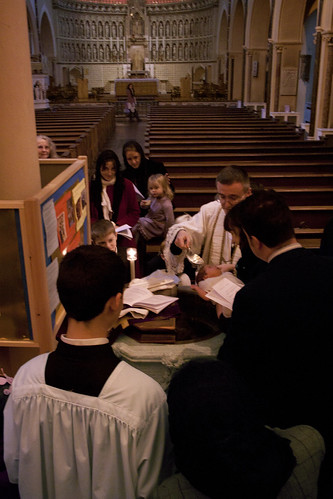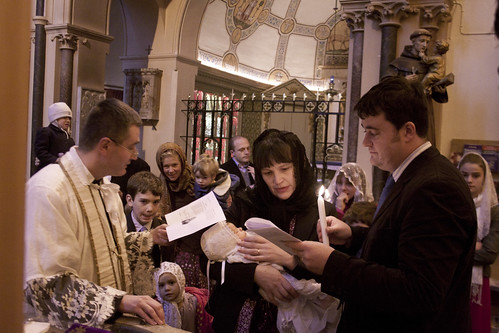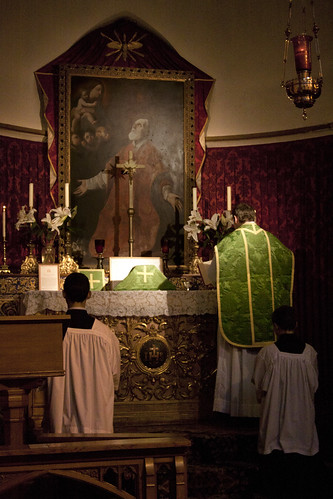In the name of the Father...
My dear friends, my dear brethren,
As the whole liturgy of today shows us, God, in His wisdom, had long ago prepared for us the most Blessed Virgin Mary. It was not just at the moment of her birth on earth that God decreed to exempt her from all sin, and to make her the Immaculate Conception but already in eternity, which preceded the creation of the world.
The epistle today recalls this fact, applying to the Most Holy Virgin the words of the eternal Wisdom; already the Holy Virgin was in the mind of God – "iam concepta eram - I was already conceived" - yes, conceived in the mind of God, and thus already in the divine plan God was thinking of the Virgin Mary. Already He wished to fill her with all His graces, and to give her this extraordinary privilege of the Immaculate Conception, exempting her from all sin: "Tota pulchra es, Maria, et macula originalis non est in te - Thou art all fair, O Mary, and there is no stain of original sin in thee."
So already in eternity, before the creation of the world, God was thinking of this admirable creature, the first of His creatures after our Lord Jesus Christ Himself. All during the course of history which preceded the birth of the Blessed Virgin, during the whole history of humanity, God was thinking of the Blessed Virgin. We see it during the entire history of the Old Testament - already, immediately after the sin of Adam and Eve, God said to Adam and Eve, "I will place an enmity between thee and the woman…..She shall crush thy head." So already the Virgin Mary had been foreseen by the Spirit of God and her preparation, the preparation for her Immaculate Conception, was becoming more and more precise the whole time.
The image of the Blessed Virgin Mary can also be found in the holy women of the Old Testament. Think of the account of Sarah, the wife of Tobias, on whose behalf an angel bound up the demon and cast him far into the desert. She is an image of the Blessed Virgin Mary, "before whom the devil must flee, and whom the devil fears." The Virgin Mary was not under the empire of Satan for an instant, a single instant.
The story of Judith also illustrates the role of the most Holy Virgin Mary. She delivered the people of Israel from the hands of Holofernes. In cutting off the head of Holofernes Judith saved Israel, and in like manner the Blessed Virgin, by cutting off the head of the devil in a certain sense, saved the people of God.
Thus during the whole course of history God wished that we be reminded of the most Holy Virgin; the Blessed Virgin Mary was always present to God and in the plan of God and thus from her birth the Blessed Virgin Mary was exempt from all sin. At the moment of her birth she was filled with the Holy Ghost, and yet again even more so - if such be possible - at the moment when the Angel Gabriel came to announce that she would be the Mother of the Savior. Behold what the Angel said to the Blessed Virgin: "Thou art full of grace, overflowing with grace, and the Holy Ghost shall descend upon thee and overshadow thee."
How could the Holy Ghost be present with the devil in the soul of the most Holy Virgin? There could be no stain in the soul of the Blessed Virgin Mary; already God had decided that. And from the beginning of the Blessed Virgin's existence, we see that, in fact, the Blessed Virgin is wholly filled with the Holy Ghost. She is shown to us as a contemplative, and living in the presence of God, speaking little, reflecting on all the words which Our Lord said. At times she deemed it right to discreetly intervene, as at the marriage feast of Cana, and this was to teach us her whole gospel: "Do whatever He shall tell you." This is the gospel of our Holy Virgin Mary.
Again, she was present at Calvary as the Mother of the Eternal Priest, at the offering of Our Lord Jesus Christ, for she also was crucified with Our Lord. If St. Paul could say, "Confixus sure cruci - I am nailed to the Cross with Christ," how much more could the Blessed Virgin Mary say it!
Again, she was also present at the moment of Pentecost, when the Apostles received the Holy Ghost - she who was already filled with the Holy Ghost, she did not need to receive Him again but through her mediation, the Apostles received Him.
Finally the Blessed Virgin Mary went up to heaven, not only in her soul but also in her body, and thus was this extraordinary life of hers completed; a life unique in the history of humanity, but foreseen by God from all eternity.
The influence of the Blessed Virgin Mary has not ceased. Even now in heaven, the Blessed Virgin Mary continues to be the Mother of the Mystical Body of Our Lord, the Mother of the Church, the Mother of our souls. She shows it, she proves it, she proves it in every one of us, but she also proves it in her apparitions. Is it not admirable to think that after the Sovereign Pontiff Pius IX proclaimed the dogma of the Immaculate Conception as a revealed truth, that the Blessed Virgin Mary was Immaculate from her Conception - already four years later on March 21, 1858, the Blessed Virgin herself said to little Bernadette, the little shepherdess, "I am the Immaculate Conception."
Remember that Bernadette was incapable of understanding, she could not understand what these words meant, and she left the grotto on her way to her pastor’s house repeating these words which she did not understand, to make sure she would not forget them. The history of the life of Bernadette tells us that it was at that moment that the parish priest of Lourdes, Pere Pomian, was truly convinced by the apparitions at Lourdes. He realized that the poor little shepherdess was incapable of inventing this herself, and that the dogma had been proclaimed four years before by the Sovereign Pontiff. Thus it was confirmed by the Blessed Virgin herself that she was the Immaculate Conception.
What lesson, then, must we draw from this history of the Blessed Virgin Mary and her Immaculate Conception? For all of us who have been baptized, we who in a certain sense have received more than others because of the offices we may occupy in Holy Church - all of us: If the Blessed Virgin Mary was Immaculate in her Conception it is because she was to be the Mother of Our Lord Jesus Christ, because she had to carry within herself Our Lord, the Son of God, because she was charged with giving Him to the world, because she was to live in proximity with Him, to be His Mother.
We Christians, who receive Holy Communion, do we not receive the same Jesus Christ, the same Body, which was conceived by the Blessed Virgin Mary? We receive Him in us, in our bodies….in our souls. If it was decreed that the Blessed Virgin Mary was to be immaculate in her conception, so that she might receive the Body of Our Lord Jesus Christ, His soul, His divinity, must we not also be pure? Not that we can be immaculate in our conception, but may our souls be immaculate, by our prayers, by our dispositions, by our efforts, by the grace of God . . . to win this privilege that the Blessed Virgin had by the gift of Our Lord Jesus Christ, may we by our prayers and by the grace of God obtain the grace of having immaculate souls to receive Our Lord Jesus Christ.
We must! We must live without sin, we must struggle against anything that might tarnish our souls, so that it can be said of our souls: "Tota pub chra est, et macula non est in te -Thou art all fair, and there is no stain in thee." Let there be no stain in our souls so that we may worthily receive Our Lord Jesus Christ.
And if that is true for Christians, true for the faithful, true for every person, every soul receiving Our Lord Jesus Christ, how much more, dear brethren, is it true of you - you who are destined in a singular way to consecrate yourselves to God, to offer yourselves to God, and particularly those who offer themselves to God in the priesthood, who, in this world, call down Our Lord Jesus Christ upon the altar and, like the Blessed Virgin, touch Him with their hands, and give Him to others; how much more must your souls be immaculate!
With what joy, therefore, do we receive today the oblations of those who desire to offer their lives, offer their souls, for the service of God, the service of the altar. Let us ask in a special way of the Blessed Virgin to transmit, in a certain degree, this privilege she had, the graces which are necessary to keep our souls immaculate.
She is the creature that was created, designed by God to destroy sin. Thus there is no creature more free of sin than the Blessed Virgin Mary. She has crushed the head of the serpent. Therefore with the Blessed Virgin there is no compromise, no compromise with sin, no compromise with error; she is completely true, completely holy. She cannot bear error, or sin, or vice. Let us then ask the Blessed Virgin that we ourselves have this horror of sin, this horror of vice - but love for sinners, because it was for sinners that she was created, to save sinners. May we have this immense desire, this flame which must consume us, the desire to save souls from sin, to snatch them from the clutches of the devil, the clutches of the world, and the scandals of it.
Therefore let us all ask today that our Society be a sign, a sign of truth, a sign of holiness, a sign of flight from sin, and all the scandals of the world, and a sign of the presence of the Virgin Mary. We will truly be children of the Church, children of Mary, on this condition. But if, unhappily, we also become like the people who are drawn by the world and who want compromises with things of the world, with error - then we will no longer be worthy children of Mary, worthy children of Our Lord.
That is what we ask, for all those who are present at this Holy Mass, for all those who are present here, and particularly for those who, in a moment, will pronounce their oblation and their engagements in the Society.
In the name of the Father, and of the Son and of the Holy Ghost. Amen.
Source: SSPX Asia










































